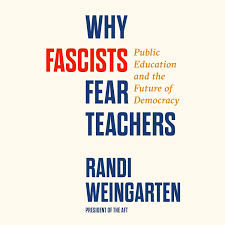 |
Reviewer: Dr. Bülent Avcı The book: Why fascists fear teachers: Public education and the future of democracy The writer: Weingarten, Randi Citation: Avcı, B. (2025, October 6). Review of the book Why fascists fear teachers: Public education and the future of democracy, by R. Weingarten. Critical Education Network. https://www.criticaleducationnetwork.net |
The president of American Federation of Teachers (AFT) wrote a book about public school teachers and fascists who are afraid of them. The writer strongly argues that public education is a key to future of democracy everywhere including USA. And that is why authoritarian, or fascist regimes attack public education and its main blood stream teachers.
Why Fascists Fear Teachers — Summary and Critique
The writer argues that fascist or authoritarian regimes—including, in the U.S. context, the Trump administration—attack teachers and public education because they fear what teachers do: cultivate critical thinking, nurture reasoning, and instill the democratic and civic values essential to a functioning democracy. Fascist regimes seek a monopoly over truth and knowledge: they don’t want a population of citizens who are capable of critical thinking and identifying propaganda and truth and holding politicians accountable. Historically, tactics such as banning or burning books and controlling or censoring curricula have been used to strip education of its democratic power and undermine teachers.
Contemporary Tactics in the U.S.
According to the writer, the current U.S. regime employs several strategies to dismantle public education and target teachers:
- Systematically cutting education budgets
- Advancing privatization initiatives such as charter schools
- Running ideological campaigns that pit parents against teachers
Why Fascists Fear Teachers
The writer emphasizes that fascist systems require obedient subjects—people incapable of critical thought and unaware of values such as diversity, equality, and respect for difference. Teachers, by contrast, help students develop the skills, values, and dispositions needed to be critical citizens and to build an agency-oriented democratic society. This fundamental clash explains the sustained hostility toward educators.
Criticisms and Weaknesses of the Book
Temporal ambiguity: It is unclear whether the author is describing a bygone era or today’s realities. If the argument is about the past that is one thing; if it claims to describe the present, we must pause and examine the evidence more closely.
Partisan selectivity since 1980: Public schools and teachers have been under attack not only from Republicans but also from Democrats. While the book criticizes Republicans—especially Trump—it says nothing about Democratic involvement, which weakens its overall credibility.
Professional status of teachers today: it is clear to anyone who takes education seriously that today’s teachers function less as professionals and more as semi-skilled technical workers. It is questionable whether they actually can and do teach critical thinking or civic values; instead, they are pushed to “teach to the test.” Neoliberal, market-driven educational policies have turned education into mere training, while deskilling teachers and reducing them to technicians of conformity and ideological indoctrination: that is to say, “teachers are no longer the guardian angel of human development” (de Assis, p. 215). Unfortunately, many teachers today, knowingly or unknowingly, participate in this dehumanizing education system.
Since 1980, both Democrats and Republicans have attacked public education through market-driven policies: deskilling teachers, enforcing abusive teacher evaluation regimes, imposing standardized tests administered by private corporations, eradicating teachers’ academic freedom and professional authority, and promoting privatization through charter schools and outsourced services. They have, in effect, set public schools up to fail and turned them into sites of profit. Yet the book does not address these realities; instead, it narrowly fixates on Trump and abstractly repeats the question of why fascists fear teachers. Ironically, the writer seems unaware of how many teachers themselves voted for Trump in the last election.
It is true that public education has been systematically undermined. Neoliberal and neoconservative reforms have targeted teachers, unions, and schools alike. While teachers’ unions often support the Democratic Party, Democrats have been equally responsible for implementing high-stakes testing, privatization, and corporate-driven reforms.
If we genuinely want schools where students develop the values, attitudes, and skills necessary to become critical, creative citizens—and if we want teachers who can and will teach critical thinking, empathy, and democratic values—we must resist the neoliberal policies and corporate forces that have colonized our schools.
Dr. Bülent Avcı
References
De Assis, S. (2003). Revolution in education. A Scarecrow Education Book.
![]()